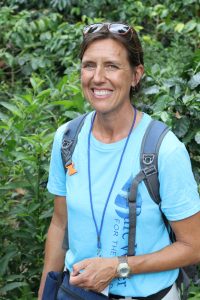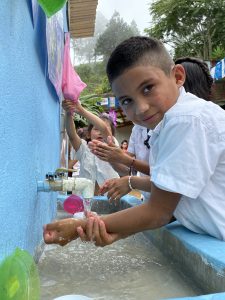A commentary written by Nathalie Pratt on March 12, 2020, with updates on March 17
 At this point, you are, no doubt, acutely aware of COVID-19…aka A novel coronavirus. And you are likely feeling the absolute chaos this microscopic entity has brought to the world. What I recently learned is “Coronavirus” is a large family of viruses that cause illnesses ranging from a simple cold to more severe diseases. They are “zoonotic” – transmitted between animals and humans. COVID-19 is the latest in this category and certainly has brought the necessity of safe hygiene practices to the forefront. (source)
At this point, you are, no doubt, acutely aware of COVID-19…aka A novel coronavirus. And you are likely feeling the absolute chaos this microscopic entity has brought to the world. What I recently learned is “Coronavirus” is a large family of viruses that cause illnesses ranging from a simple cold to more severe diseases. They are “zoonotic” – transmitted between animals and humans. COVID-19 is the latest in this category and certainly has brought the necessity of safe hygiene practices to the forefront. (source)
As I was showering after working out at the gym today, I found myself thinking about the cleanliness of the shower itself. My gym has plastic shower curtains, and I couldn’t help but wonder if a harmful virus could cling to one. Having to touch the curtain as I exited the shower left me somehow feeling a bit less “clean” than normal. My mind then drifted to daily life in Haiti and Honduras, where I have had the amazing opportunity to travel with Pure Water for the World on many occasions.
When PWW takes volunteers on trips to Honduras and Haiti, trip leaders advise volunteers extensively about the need to protect themselves from the harmful pathogens that are present in the water, even in the most developed areas of the countries. It is recommended that volunteers bring hand sanitizer and wipes to Honduras and use them frequently…certainly before consuming any food or drinks, after helping to install water filters with contaminated water, even after washing their hands with water that is running in the hotels and restaurants. Trip leaders recommend against putting one’s toothbrush in the water running from the faucet, keeping one’s mouth and eyes closed in the shower, and bumping elbows* rather than shaking hands with community members. Sound familiar? And, of course, absolutely NO drinking of the water from the tap or unknown sources…ever.
*Note: Since this piece was written, elbow bumping recommendations have been updated to “social distancing.”
Many years ago now, the PWW team realized that for clean water programs to really be sustainable, families and community members needed to learn the how and why of practicing healthy hygiene…meaning they actually had to change long-standing, multi-generational behaviors.
When one grows up with no running water, no toilet, and no sink in the home, learning the practice of handwashing simply does not occur. Parents don’t teach children at home and teachers don’t employ practices at school because they lack both the basic tools and the essential understanding about the importance of safe hygiene practices. PWW is changing that reality.
The PWW team recognized the need for proper tools and for hygiene education and put together what has now become a comprehensive safe WASH (water, sanitation and hygiene) program…complete with clean water filters, latrines, and extensive hygiene education that includes environmental, home, personal and menstrual hygiene management. These trainings, required of all families PWW serves, have not only resulted in changed behaviors, but they have transformed the impact of the water and sanitation programs.
Much of what is regularly taught by PWW are practices now being heavily emphasized by the CDC and WHO to protect ourselves from this new and seemingly invasive virus. A study conducted by the USDA in 2018 revealed that “consumers fail to correctly wash their hands 97 percent of the time, with the most common mistake being not washing hands long enough” (source). And, depending on the study, only 60-66% of Americans actually wash their hands after using the restroom. I can’t help but wonder how this virus, and the newfound emphasis on simply washing hands properly, will impact our own hygiene behaviors long-term.
 We could all learn a great deal from the PWW trainers in Honduras and Haiti. They are experts at teaching critical hygiene practices that have the ability to transform communities by eliminating waterborne illnesses as well as illnesses caused by other harmful viruses and bacteria. They have perfected the 20 second handwashing process (see video below), teaching children catchy songs that keeps them washing longer. I find myself singing this song as I wash my hands these days, spending longer under the water than my previous “normal”.
We could all learn a great deal from the PWW trainers in Honduras and Haiti. They are experts at teaching critical hygiene practices that have the ability to transform communities by eliminating waterborne illnesses as well as illnesses caused by other harmful viruses and bacteria. They have perfected the 20 second handwashing process (see video below), teaching children catchy songs that keeps them washing longer. I find myself singing this song as I wash my hands these days, spending longer under the water than my previous “normal”.
The people of Haiti and Honduras, who live in the rural, underserved communities where PWW works, also possess a powerful and inherent behavior…working in community. Community members must rely on one another to create the greatest outcome for all. When each community member takes responsibility for personal choices, including hygiene behaviors, it has a domino effect on the whole community. Isn’t that how it should be?
We all anxiously await the day when COVID-19 is under control, and we start to put our disrupted lives back together. Perhaps some of the good practices we have been using more regularly will remain in place…or…maybe we will revert back to older habits. Only time will tell.
But the pathogens Hondurans and Haitians face are not going away any time soon. And the healthy hygiene practices learned from PWW must become embedded into their way of life. These newly acquired behaviors have the power to protect their health and wellbeing…not just today, but for future generations.
As of yesterday (2/11), Honduras reported the first two confirmed cases of COVID-19. Across the globe, safe hygiene practices are essential. But, what if you didn’t have the tools or knowledge to keep your body, home and environment clean?
